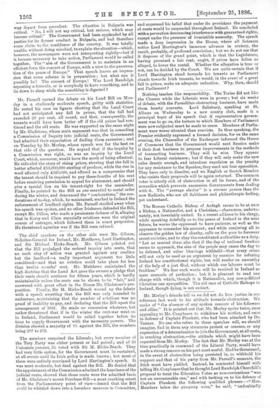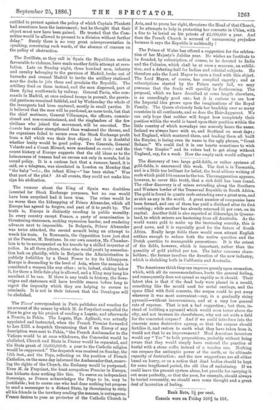Mr. Morley's friends tell us we did not do him
justice in our reference last week to his attitude towards obstruction. We spoke of "the absence of any spoken censure of his followers and allies." It is pointed out that Mr. Morley spoke twice, once appealing to Mr. Conybeare to withdraw his motion, and once in defence of Captain Plunkett, who had been attacked by Dr. Tanner. No one who refers to these speeches will, we should imagine, find in them any strenuous protest or censure, or any expression of a determination to join the Government, at all costs, in crushing obstruction,—the attitude which might have been expected from Mr. Morley. The fact that Mr. Morley was at the time practically in command of the Liberal Party, would have made a strong censure on his part most useful. Had he threatened, in the event of obstruction being persisted in, to withhold his support and that of his party from Mr. Parnell's measure, the Irish must have yielded. Instead, he contented himself with telling Mr. Conybeare that he thought Lord Randolph Churchill's proposal to treat the Education Votes as non-contentious "was not an unreasonable one," and with tacking on to his defence of Captain Plunkett the following qualified phrases :—" Hon. Members below the gangway were," he said, "undoubtedly
entitled to protest against the policy of which Captain Plunkett had sometimes been the instrument ; but he thought that their -object must now have been gained. He trusted that the Com- mittee would be allowed to proceed to a division without further delay." Surely there is no very great misrepresentation in speaking, concerning such words, of the absence of censure on the policy of obstruction.



































 Previous page
Previous page